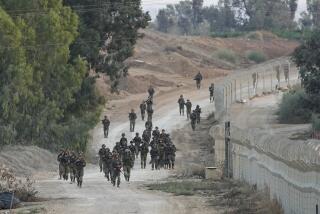Why the U.S. Didn’t Know : CIA’s Gates agrees that Iraq intelligence fiasco mustn’t be repeated
- Share via
Starting in the early 1980s, some thoughtful American intelligence specialists began voicing their concerns that the United States, because of its intense focus on the strategic threat from the Soviet Union, was paying far too little attention to what certain irresponsible Third World regimes might be up to. Nowhere, it’s now clear, were those worries more justified than in the case of Iraq.
Testifying before the House Banking, Finance and Urban Affairs Committee, CIA Director Robert M. Gates has acknowledged that U.S. intelligence agencies badly misread Iraq’s intentions in the aftermath of its costly war with Iran. Less than a year before Saddam Hussein’s August, 1990, invasion of Kuwait, the CIA forecast to President Bush that Iraq would leave its neighbors alone for at least the next two or three years.
The Pentagon, said Gates, remained edgy. It identified Iraq--not Iran, whose ambitions had alarmed American officials for a decade--as the chief threat to U.S. interests in the Persian Gulf. But the intelligence estimate that went to the White House contained no hint of early Iraqi aggression. “We provided them with a message of reassurance,” Gates testified, “and we were wrong.”
Did that reassurance further encourage the longtime policy of appeasement toward Iraq that began under Ronald Reagan’s Administration and carried over into the Bush presidency? That’s a question that Rep. Henry B. Gonzalez (D-Tex.), the Banking Committee chairman, is pursuing.
Gonzalez’s committee has been investigating the diversion to weapons purchases of some loans made to Iraq in the late 1980s. The investigation has further revealed an extensive network of covert U.S. assistance to Iraq through much of the 1980s. Gates’ testimony about intelligence shortcomings may help illuminate the curious pro-Iraq policies of the last two administrations. Most of all, it further underscores the critical need to deepen intelligence penetration of such potentially threatening countries as Iraq. The invasion of Kuwait and, even more, the extent of Iraq’s nuclear program, were surprises that could have become disasters. The nation can’t afford similar intelligence failures in the future.
More to Read
Sign up for Essential California
The most important California stories and recommendations in your inbox every morning.
You may occasionally receive promotional content from the Los Angeles Times.










